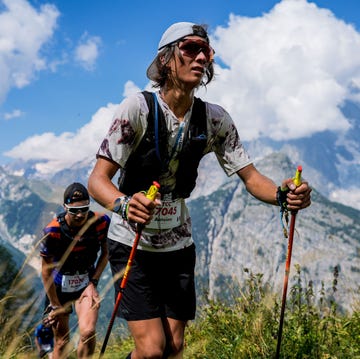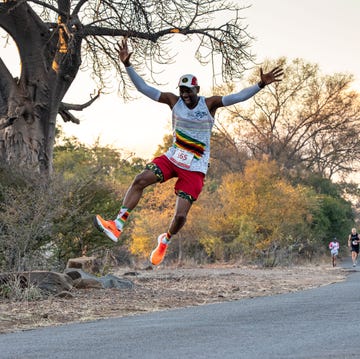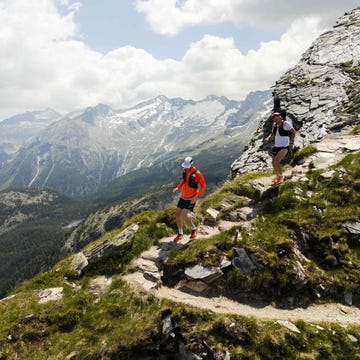The race company behind Great North Run is hoping to set a template for sustainable trail races via the development of the 13 Valleys Ultra series.
The Lake District event, which held its inaugural race in September last year, has four distance options at 20km, 55km, 110km or 180km. The route, which begins in Ambleside, weaves through the World Heritage Site, linking together 13 stunning natural valleys taking in almost 7,000 metres of elevation on the longest route.
Parent company Great Run are currently subsidising the event, which will run for the second time from 27-29 September 2025, while it finds its feet in the ultrarunning world.
What everyone's reading
Runner’s World sat down with the 13 Valleys race director Colin Murphy to unpack its sustainability plan and discover how they hope to create a blueprint for the future.
‘There is no one particular sin like plastic water bottles that we want to highlight and avoid. It is about tackling it as a brand-new event and having sustainability baked in from the start. Sustainability is always the thought process. That doesn't mean it's always perfect. But it's always involved in every decision,’ says Murphy, setting out his stall from the get-go.
Being a new event enables 13 Valleys to be more ‘agile and nimble’, Murphy says, who admits making events like the Great North Run more environmentally friendly is a much harder task. 'We can be much more forward thinking [with this than we can] when trying to turn a big existing event around and change people's perception [of it]. That's a different challenge.'
Park protection
Working closely with the Lake District National Park has been key to developing the event. Bottle necks are avoided on the course to prevent people straying off the paths and 5% of race tickets and car parking sales go directly to the Lake District Foundation. These funds are used in the 'fix the fells' programme which maintains the footpaths.
Competitor flow through the course is measured by runners with video cameras so wave times can be adjusted. Murphy said this is key to growing participant numbers, which will ultimately be driven by the environmental impact and the capacity the fells can handle.
‘We have people running [with cameras] in the middle of the pack to get a sense of the density so we can check on flow rates and whether we are putting the right amount of people in the right timeframe through certain sections.’
Travel plans
Anyone who has read Damian Hall’s book, We Can’t Run Away From This, will know that the biggest environmental factor around racing is travel. Murphy also recognises this as a huge dilemma for races but one he feels needs to be balanced against the mental and physical health benefits of running, and racing.
To mitigate some of the harm caused by participates driving to 13 Valleys, the race promotes local transport links (you can get a direct train from London to Penrith which takes just three hours) and provides buses to the start line, which 70% of runners use. More significantly, it encourages multiple car occupancy by placing a levy on vehicles with less than three occupants. Again, 5% of this levy and car parking charges go to the Lake District Foundation.
The race also encourages participants to offset their journey by replacing commutes with training runs in the lead up to the event, staying longer in the Lakes to maximise travel and collecting litter while out running.
‘It’s about having it in people's minds all the way through their training journey – not just when they arrive at the event,’ says Murphy.
Electric vehicles provided by BMW are used to recover people from the course if they DNF and need transport back to the race hub. This recently caused controversy when running and climate activism group The Green Runners listed 13 Valleys as an 'Oily Race' due to its links with BMW. This was owing to 13 Valleys listing the BMW logo on its website which was misconstrued as a sponsor.
‘It was really disappointing to be on a list of events dripping in oil,' said Murphy. 'We need vehicles to pick people up off the route. We would rather use electric ones that are sourced from the area. We acquire them from a local branch in Cockermouth and just loan them for the weekend. They do not sponsor the race.'
The Green Runners subsequently removed 13 Valleys from the list and said they considered the arrangement a 'provider relationship rather than sponsorship or sportswashing'.
A spokesperson added: ‘It sounds like the event is working really hard on sustainability and we applaud that.’
The 13 Valleys website has now been updated to clarify that BMW is a provider of EV vehicles.
Reuse and recycle
Medals are always a contentious issue and are usually the one thing runners are not prepared to forego. On finishing the 13 Valleys, competitors will receive a medal made of slate from local mines which doubles up as a coaster. Any spare medals are sent back to be recycled.
‘There is zero waste. We can also use the same lanyards every year as they have no year date on them,’ said Murphy.
There is also no finisher tee although a limited range of products made from organic cotton are available to buy. They have no year printed on them so can be sold year after year.
Cutting back on clothing waste is supporting via a preloved pop-up stand at the event where people can bring old or unused kit, which is then sold second hand. Meanwhile, Lake District brand Inov-8 is sponsoring the race via weatherproof kit for onsite staff.
This is an event that isn't just banning plastic bottles and patting itself on the back that it has ticked a green box. Everything down to the waymarkers have been thought through: signage is made from durable rather than disposable material so it can be used every year, reducing its carbon footprint. And the use of existing buildings for race admin also means no diesel generators are required.
Food for thought
Aware of the impact of farming on the environment, 13 Valleys is working with Voom to provide vegan energy bars at the race.
‘We don’t want to force veganism on people. We want it to be a welcoming event so it’s hard to find that balance. We want to offer a really good range of options and lot of that will be vegetarian. A local vegan café is also proving food at the first hot food station,’ says Murphy, who has been hands-on in sourcing vegan nutrition. ‘I never realised quite how hard it is to find vegan jelly sweets until the start of this process, but they do exist!’ he added.
Critical friend
As the event inevitably grows the sustainability ethos will be put to the test and perhaps only time will tell whether this really is a blueprint for trail races.
But 13 Valleys is open to feedback and wants to learn and adapt to find the best way forward. ‘We are always keen to investigate new ways of doing things. We want sustainability to be the key thread that runs through the race because we want it to be here for a long time,’ concluded Murphy.

















